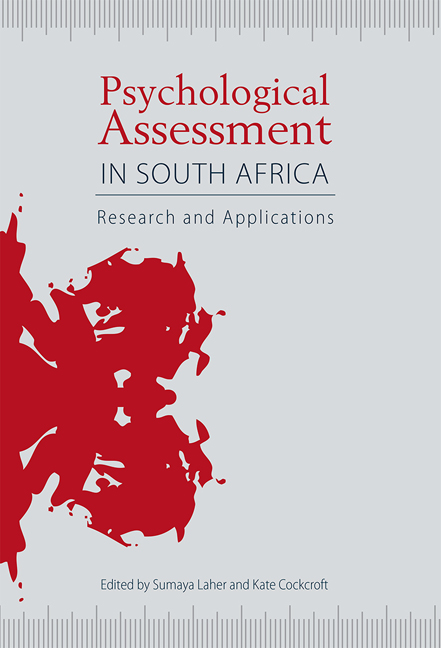Book contents
- Frontmatter
- Contents
- Tables and figures
- Acknowledgements
- Acronyms and abbreviations
- 1 Contextualising psychological assessment in South Africa
- Section One Cognitive tests: conceptual and practical applications
- Section Two Personality and projective tests: conceptual and practical applications
- 14 The Sixteen Personality Factor Questionnaire in South Africa
- 15 Using the Fifteen Factor Questionnaire Plus in South Africa
- 16 The Basic Traits Inventory
- 17 The Myers-Briggs Type Indicator® in South Africa
- 18 The NEO-PI-R in South Africa
- 19 Using the Occupational Personality Profile in South Africa
- 20 The Occupational Personality Questionnaire
- 21 The Millon Inventories in South Africa
- 22 Assessment and monitoring of symptoms in the treatment of psychological problems
- 23 Assessment in routine clinical and counselling settings
- 24 Projective assessment of adults and children in South Africa
- 25 The use of the Children's Apperception Test and Thematic Apperception Test in South Africa
- 26 Projective assessment using the Draw-A-Person Test and Kinetic Family Drawing in South Africa
- 27 The Rorschach in South Africa
- Section Three Assessment approaches and methodologies
- Contributors
- Index
21 - The Millon Inventories in South Africa
from Section Two - Personality and projective tests: conceptual and practical applications
Published online by Cambridge University Press: 21 April 2018
- Frontmatter
- Contents
- Tables and figures
- Acknowledgements
- Acronyms and abbreviations
- 1 Contextualising psychological assessment in South Africa
- Section One Cognitive tests: conceptual and practical applications
- Section Two Personality and projective tests: conceptual and practical applications
- 14 The Sixteen Personality Factor Questionnaire in South Africa
- 15 Using the Fifteen Factor Questionnaire Plus in South Africa
- 16 The Basic Traits Inventory
- 17 The Myers-Briggs Type Indicator® in South Africa
- 18 The NEO-PI-R in South Africa
- 19 Using the Occupational Personality Profile in South Africa
- 20 The Occupational Personality Questionnaire
- 21 The Millon Inventories in South Africa
- 22 Assessment and monitoring of symptoms in the treatment of psychological problems
- 23 Assessment in routine clinical and counselling settings
- 24 Projective assessment of adults and children in South Africa
- 25 The use of the Children's Apperception Test and Thematic Apperception Test in South Africa
- 26 Projective assessment using the Draw-A-Person Test and Kinetic Family Drawing in South Africa
- 27 The Rorschach in South Africa
- Section Three Assessment approaches and methodologies
- Contributors
- Index
Summary
Theodore Millon (1969; 1991; 1994; 1996b; 2010) argues that predominant theories of personality tend to focus primarily on either the intrapsychic, interpersonal, environmental or biological aspects involved in personality development. Instruments, particularly objective, self-report questionnaires, are then developed in relation to these theories to assess personality. However, personality is more than just intrapsychic or interpersonal factors.
Millon attempts to combine the intrapsychic, cognitive and interpersonal spheres in his theory. He also acknowledges that an integrated approach needs to go beyond psychology if it is to be truly holistic (Millon, 1996b). In keeping with this argument, he borrows from evolutionary biology to develop his biopsychosocial evolutionary theory of personality, which underpins a number of instruments developed under the Millon umbrella.
The Millon family of instruments consists of pre-adolescent, adolescent, adult and medical patient inventories. The Millon Pre-Adolescent Clinical Inventory (M-PACI) is a comprehensive clinical tool that is designed to quickly and accurately identify psychological problems in children between the ages of 9 and 12. Unlike other instruments that focus on single clinical areas such as depression or anxiety, the M-PACI provides a synthesis of the child's emerging personality style and clinical syndrome, and can assist with early intervention (Millon, 2010). The Millon Adolescent Personality Inventory (MAPI) is a measure that assesses eight personality style dimensions, expressed concerns and behavioural correlates in normal adolescents aged 13 to 18 years (Millon, 2010). The Millon Adolescent Clinical Inventory (MACI) was developed specifically for use in regard to diagnostic assistance, treatment formulation and outcome measure in the clinical setting, and is used primarily for the evaluation of adolescents with difficulties. The MACI supplements the MAPI in providing a more holistic picture of the adolescent's personality type and clinical difficulties that he or she may be experiencing (Millon, 2010).
The Millon Inventories also include the Millon College Counselling Inventory (MCCI), Millon Behavioural Medicine Diagnostic (MBMD) and Personality Adjective Check List (PACL). The MCCI is an assessment tool that can help address students’ concerns and student-specific issues such as depression, stress, anxiety, substance abuse, suicidal ideation, and adjustment and relationship difficulties (Millon, 2010).
- Type
- Chapter
- Information
- Psychological Assessment in South AfricaResearch and Applications, pp. 292 - 306Publisher: Wits University PressPrint publication year: 2013



